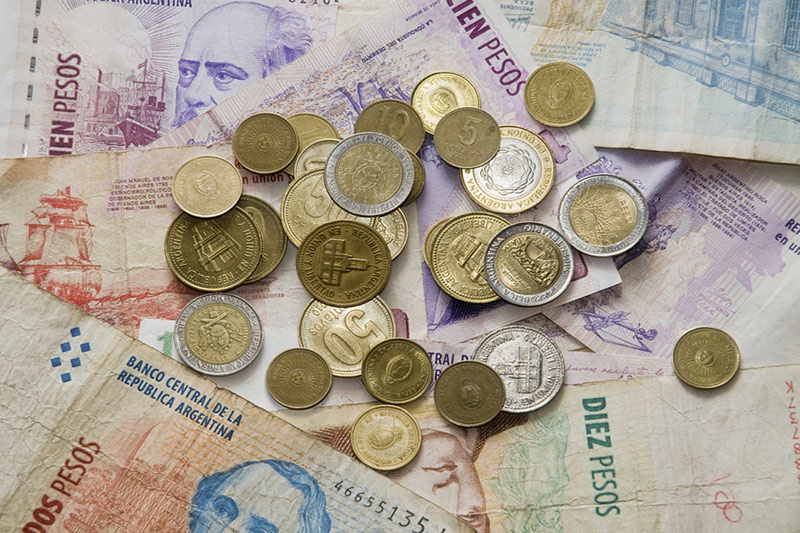(Bloomberg) -- Argentine stock investors battered by a currency collapse may be on the cusp of some relief as MSCI Inc. considers an upgrade to emerging-market status.
Morgan Stanley (NYSE:MS) says the benchmark equity index could jump 20 percent if the classification is raised in a decision set to be announced June 20, or sink 5 percent if it’s left as a lower-grade frontier market. Funds with $1 trillion in assets follow MSCI’s indexes, and JPMorgan Chase & Co (NYSE:JPM). says an upgrade would bring $3.8 billion of inflows to the local stock market.
A boost in status would reward President Mauricio Macri for his efforts to normalize the economy since he took over in 2015, and couldn’t come at a better time for Argentine investors after a peso rout that’s created one of the world’s worst performing stock markets in dollar terms during the past three months.
But investors are concerned that the market turmoil -- which prompted Argentina to take out a $50 billion credit line from the International Monetary Fund this month -- could be a reason for MSCI to maintain the frontier status, a designation the nation has held since 2009 following a downgrade that stemmed from capital controls.
“All the different things that the government has been doing since the election of President Macri are consistent with Argentina being back in the emerging markets category,” said Gerardo Rodriguez, who manages about $600 million of assets at BlackRock Inc (NYSE:BLK). but won’t touch Argentine stocks because of their lowly classification. “On the other hand, you have the recent volatility and concerns from a macro perspective. In the medium term I’m sure it will happen. Short term, not so sure.”
Argentine investors went through this drama a year ago, when analysts at half a dozen Wall Street banks predicted an upgrade on the heels of Macri policies including allowing the peso to float freely, removing a rule that established a minimum period for portfolio flows to remain in the country and ending the need for central bank approval to repatriate funds. MSCI ultimately kept Argentina’s frontier designation, saying it needed to assess “the irreversibility” of changes that improved access to the market.
This year, only a handful of analysts have said they expect an upgrade, and they often added caveats. An investor survey by Bank of America (NYSE:BAC) last week found that while 58 percent of participants thought Argentina deserved an upgrade, only 38 percent think it will actually get one.
During the past year, the stock exchange implemented the remaining items in MSCI’s emerging-market criteria, such as implementing short selling of stocks. Still, officials have lots of leeway to decide whether to elevate the status to the level of Brazil, Mexico, South Korea and Russia, or keep it with countries such as Bahrain, Sri Lanka, Vietnam and Slovenia.
Sebastien Lieblich, a managing director at MSCI, said in a May interview that Argentina has shown its commitment to avoiding capital controls, and that boded well for an upgrade. But officials will also consider investor sentiment, and volatility has “raised questions.” The peso has tumbled 33 percent this year, reaching a record Thursday at 27.7 per dollar.
The benchmark Merval index has slumped 32 percent this year in dollar terms following a two-year, 80 percent surge. The main drag has been investor concern about fiscal accounts, inflation and central bank independence, which helped make the peso the worst-performing major currency this year. Officials have sought to arrest the decline by jacking up interest rates, intervening directly in the market and taking out the IMF credit line.
Optimists say mid-term elections last year showed broad support for Macri’s policies and should bolster confidence that his economic reforms will stay in place. But if Argentina is passed over once again, MSCI may wait to see the results of presidential elections in October 2019 before considering an upgrade again, according to Morgan Stanley. That means another chance at emerging-market status may not appear until 2020.
A positive decision this year “should be a walk in the park -- there’s no reason why Argentina wouldn’t be upgraded,” said Oliver Bell, a money manager who oversees $500 million of assets at T. Rowe Price Group Inc., including Argentine stocks. But after the volatility, “one wonders if it gives MSCI an excuse to delay it again.”
(Updates peso price in ninth paragraph.)
